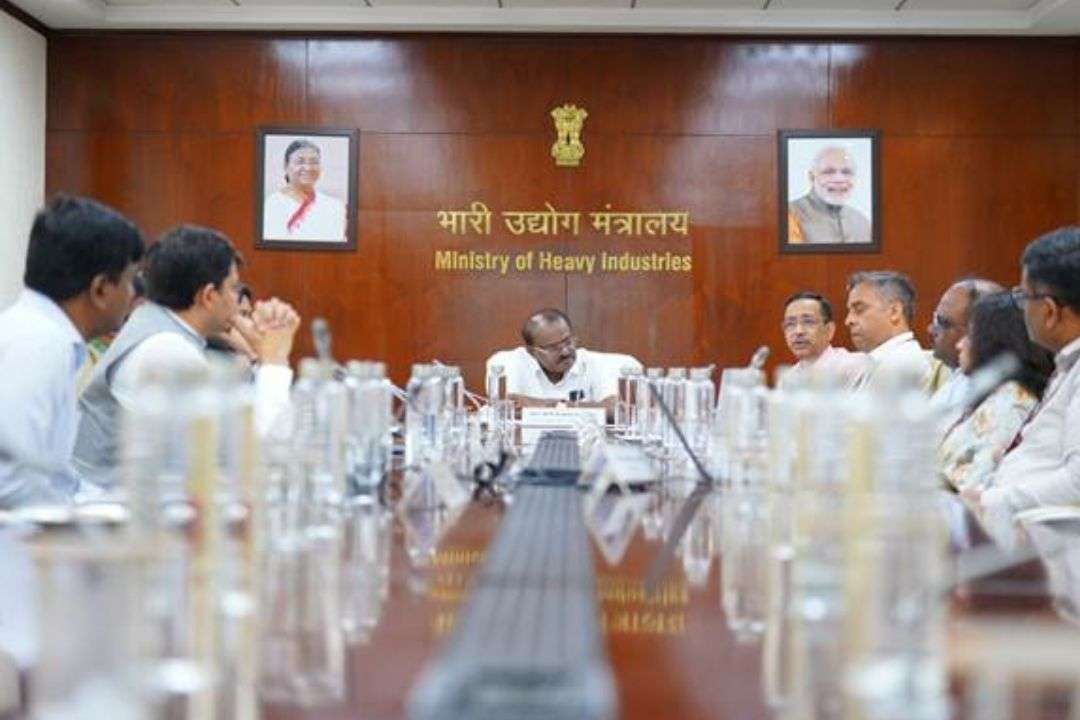Union Minister for Heavy Industries and Steel, HD Kumaraswamy, on Friday launched a new initiative under the PM E-DRIVE programme, introducing India’s first direct incentive scheme for buyers of electric trucks. Under this scheme, eligible buyers may receive up to ₹9.6 lakh per vehicle. The government has earmarked ₹500 crore specifically for electric trucks, as part of the broader ₹10,900 crore PM E-DRIVE programme.
The initiative targets industries such as ports, logistics, cement, and steel, with plans to support the adoption of approximately 5,600 electric trucks. The Minister highlighted the significant environmental benefits, noting that while diesel trucks account for just 3% of India’s vehicle population, they are responsible for 42% of transport-related greenhouse gas emissions.
He called the scheme a crucial step toward cleaner freight transportation and a milestone in India’s path toward achieving a net-zero emissions goal by 2070 and realising the vision of a developed India by 2047. In a social media update, the Minister said the scheme will also boost domestic manufacturing, increase localisation, reduce logistics costs, and create employment opportunities across the electric mobility and battery supply chains.
The scheme includes special provisions for the National Capital Region, with around 1,100 e-truck incentives reserved for Delhi, backed by a ₹100 crore allocation. This aims to address air quality issues in the capital.
To qualify for the incentive, scrapping of old polluting trucks is mandatory. The financial support will be determined based on the gross vehicle weight of the electric truck, with the maximum benefit capped at ₹9.6 lakh. The incentives will be applied directly to the purchase price and reimbursed to original equipment manufacturers (OEMs) through a dedicated portal, following a first-come, first-served approach.
The scheme covers demand incentives for electric trucks falling under the N2 and N3 categories as defined by the Central Motor Vehicle Rules. N2 includes trucks with a gross vehicle weight between 3.5 and 12 tonnes, while N3 includes trucks with gross weights above 12 tonnes and up to 55 tonnes.
To ensure reliability, participating manufacturers must offer warranties: five years or 5 lakh kilometres for the battery, and five years or 2.5 lakh kilometres for the vehicle and motor—whichever comes first.
Several manufacturers have already begun production of electric trucks domestically. The initiative marks the government’s first customer-directed support scheme for electric trucks. Unlike the FAME initiative—which focused on manufacturer incentives—this programme directly encourages buyers by offering subsidies at the point of purchase.
Secretary of the Ministry of Heavy Industries, Kamran Rizvi, noted that the scheme promotes local sourcing through a phased manufacturing programme, limiting the use of imported components. As part of this initiative, the Steel Authority of India Ltd (SAIL) has committed to deploying 150 electric trucks over the next two years, and has set a target of converting 15% of its hired vehicle fleet to electric.
Mr Rizvi also shared performance updates from PM E-DRIVE’s other segments. In the three-wheeler category, the original two-year target of two lakh vehicles is nearing completion, with 1.6 lakh already supported. In the two-wheeler segment, 12 lakh vehicles have received support out of a planned 24.5 lakh.
Additionally, the Ministry has approved the deployment of electric buses in several major cities: 4,500 in Bengaluru, 2,800 in Delhi, 2,000 in Hyderabad, 1,000 in Ahmedabad, and 600 in Surat—totaling approximately 10,400 buses. According to Mr Rizvi, this includes the nation’s largest electric bus tender, floated by Convergence Energy Services Ltd (CESL), which is expected to attract substantial interest from both investors and manufacturers.
Regarding the electric ambulance segment, one model received regulatory approval last month. Additional models are under development, and new safety and healthcare guidelines are being drafted in consultation with the Ministries of Health and Road Transport. These are expected to be released in tandem with the commercial availability of electric ambulances by the end of the year. Mr Rizvi confirmed that Force Motors has homologated an electric ambulance, although mass production is yet to commence.








